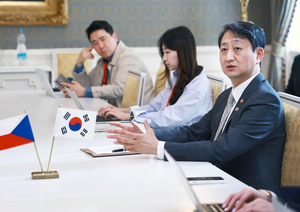 South Korean Industry Minister Ahn Duk-geun speaks during a press conference in Prague, the Czech Republic on Wednesday. (Joint Press Corps)
South Korean Industry Minister Ahn Duk-geun speaks during a press conference in Prague, the Czech Republic on Wednesday. (Joint Press Corps) PRAGUE — South Korea and the Czech Republic reaffirmed their commitment on Wednesday to advance their $18 billion nuclear power plant construction deal and expand cooperation across key industrial sectors, despite a court ruling that temporarily delayed the contract signing.
“While today’s unforeseen circumstances prevented us from finalizing the main contract, I feel confident that, like the saying ‘the ground hardens after rain,’ this shared challenge has only strengthened the trust between our two countries,” South Korean Industry Minister Ahn Duk-geun said during a press briefing Wednesday.
The contract between Korea Hydro & Nuclear Power and Elektrarna Dukovany II (Edu II), a subsidiary of the Czech state utility CEZ, was originally scheduled to be signed that day. However, it was delayed after a court injunction was granted in response to a legal challenge by French energy company EDF, the unsuccessful bidder in the tender.
During the press event, Ahn emphasized that the Dukovany nuclear project could serve as a springboard for the two countries to jointly expand into third-country markets.
Currently, Korea is constructing two new nuclear reactors — the Shin Hanul 3 and 4 — domestically. With the additional two reactors planned for the Czech Republic and ongoing talks with other countries, Korea’s domestic ecosystem alone will not be sufficient to meet all demand, the minister explained.
“That is why we aim to leverage Czech assets — for example, turbine manufacturers like Doosan Skoda Power — and grow together as strategic partners in the global market,” Ahn said.
While acknowledging the unexpected delay caused by the Brno Regional Court’s issuance of a preliminary injunction on Tuesday, Ahn stressed that it is purely “procedural” and not indicative of any risk of cancellation.
“Once we clarify the facts to the Czech public, I believe this could become a positive turning point, especially for future projects like Temelin,” he said. “Our goal is to present Korea as the most reliable long-term partner for 50, 60 even 100-year nuclear projects.”
Later in the day, Ahn paid courtesy visits to Czech Prime Minister Petr Fiala and Senate President Milos Vystrcil, accompanied by Korea’s special delegation. During the meetings, the two sides agreed to strengthen their strategic partnership not only in nuclear energy but also in advanced manufacturing, supply chains, energy, high technology and applied sciences.
Among the 14 agreements and memoranda of understanding signed by the two governments and companies on Wednesday were a Korea-Czech battery cooperation MOU and a commitment to strengthen joint responses to the forthcoming EU Battery Regulation.
The Korea Automotive Technology Institute and the Korea Institute for Robot Industry Advancement also signed two letters of agreement with Czech technical universities to establish joint industrial cooperation centers, expanding the scope of collaboration beyond nuclear energy to other advanced industries.
Meanwhile, during a Cabinet meeting in the afternoon, the Czech government approved that the new nuclear plant construction contract can be signed as soon as the court injunction is lifted.
By Jo He-rim & Joint Press Corps
herim@heraldcorp.com
